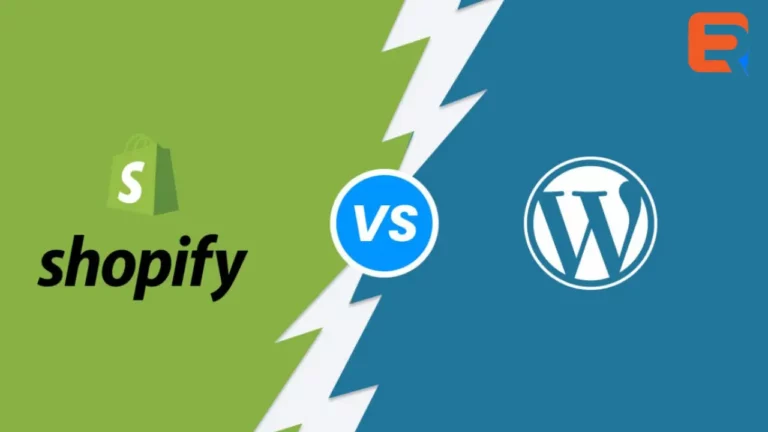Evaluating Search Capabilities and Performance in Shopify and WordPress
ECommerce businesses today are in a never-ending attempt to create a robust online presence. Under such circumstances, the selection between Shopify vs. WordPress is crucial.
This decision is important for both types of businesses; the ones that are just starting and those seeking expansion. In both cases, the eCommerce business seeks a platform that matches one’s plans and empowers one to get value for money.
The advantages of both platforms are often ambiguous from one another and separately, the platforms are ideal for different types of customers.
When we put the range of pricing plans under consideration, Shopify has more of them. This only goes to show that Shopify will be the ideal eCommerce platform for you in case your business has typical requirements.
WordPress, on the other hand, is free. But, it requires a web merchant to pay for hosting.
So WordPress delivers more flexibility, as powered by customization options that hosts such as Bluehost make available.
In Shopify also, user-friendly customizations and visually appealing templates are on offer. But, in the same coin, in WordPress, unlimited options for customization are made available, as powered by CSS and HTML editing. So, with WordPress, a merchant enjoys full control of web design.
Now, let us move the discussion on to eCommerce tools. Shopify benefits businesses with a host of inbuilt features for shipping rates, integrated payment options, and cart recovery.
These functionalities can be achieved in WordPress as well, but the reliance is on extensions and plugins for the purpose. The advantage that comes into the picture with this arrangement is that you come across the right plugins to meet your unique requirements.
SEO performance: Shopify vs. WordPress
Even though Shopify and WordPress are both SEO friendly, WordPress enjoys a marginal edge because its SEO capabilities go deep. This includes titles and metadata which enhance your store’s visibility in search results.
Now, when we take a look at Shopify, we see that managing payment gateways is reasonably simpler. This is powered by integrated options such as Stripe and PayPal. WordPress, on the other hand, may require additional setup to make these payment choices available.
In Shopify, built-in tools for reporting are available that let you track customer information and orders. For reporting and analytics purposes, similar tools are available in WordPress as well.
Site security: Shopify vs. WordPress
If it is a Shopify website that you own, the hosting is conducted by the platform which also manages the security of your website.
However, in the case of WordPress, the merchant is the one responsible for the website’s hosting. So, he’d manage security, updates, and installation.
By default, Shopify’s templates are mobile responsive. However, in the case of WordPress, adjustments may have to be made to attain optimal mobile compatibility. For the latter, this varies from one theme to another.
Moving on to the characteristics of WordPress and Shopify, we see that Shopify is a dedicated platform for eCommerce. This is unlike WordPress, where the use of an eCommerce plugin such as WooCommerce is a must to attain the eCommerce functionality.
Even as the features of WooCommerce are powerful, the merchant has to manage the plugin’s installation and customization.
Now, when we discuss integration, Shopify can be integrated with eBay and Amazon, and also services such as Instagram. This lets a merchant derive the maximum value from the multi-channel sales approach.
Similar results can also be achieved by WordPress. But while the bid is more tedious, the use of specific plugins will also be involved.
How does a merchant choose between Shopify vs. WordPress for creating an e-commerce store?
It is only right to say that choosing between Shopify vs. WordPress will be defined greatly by a merchant’s business goals and ideas.
If it is an innovative solution that a merchant seeks wherein elaborate features are made available for cart recovery and support, Shopify becomes the default choice.
Similarly, the key reason why merchants choose to take the services of WordPress is because of WordPress’s refined customization capabilities, as powered by its elaborate plugins.
Shopify and WordPress; both have elaborate deliverables available for the benefit of online merchants. They not just let you create and manage, but also grow your brand online.
A merchant is likely very particular about optimizing SEO capabilities such that his business gets the maximum benefit online. WordPress gives a merchant the choice of attaining some serious SEO customization, as powered by elaborate options and SEO plugins.
Shopify is SEO friendly but does not deliver the same depth in SEO customization as WordPress.
Analytics and reporting: Shopify vs. WordPress
Shopify is known to be a high performer in terms of reporting and analytics. With the inbuilt tools that Shopify makes available, access to data is immediate.
When we consider the case of WordPress, there is reliance on plugins to achieve the same functionality. If a merchant intends to have the same data on hand in real time, he may want to integrate a third-party analytics tool into his website.
Shopify brings some other important advantages to the table as well, in the sphere of messaging and email marketing. Both of these are essential features for eCommerce. In the case of Shopify, these features come as a part and parcel of the package.
In WordPress as well, these features can be achieved but only via the use of plugins. An important advantage that comes with the arrangement is that you get to choose your preferred email marketing service.
Discount codes: Shopify vs. WordPress
For a host of online retailers, discount codes are an important business implement. In Shopify, this feature is offered as a part of the standard package.
In WordPress as well, one could come across a host of plugins that help with coupons and discount codes.
Conclusion:
So, after considering the pros and cons of Shopify and WordPress with regard to his requirements and business plan, a merchant can decide if he wants to build his store or migrate it to Shopify or WordPress.




